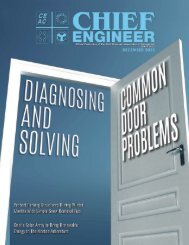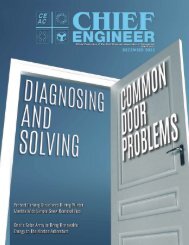CEAC-2020-04-April
You also want an ePaper? Increase the reach of your titles
YUMPU automatically turns print PDFs into web optimized ePapers that Google loves.
Q: How long does the COVID-19 remain<br />
active on furnishings?<br />
A: That also depends on what furnishings we are<br />
talking about. Tests confirm that the COVID-19 virus<br />
remains viable on the surface of objects for as little as 2<br />
hours and for as long as 9 days. Metal, such as stainless<br />
steel, seems to prolong the active life of the virus while<br />
other surfaces, like wood, reduce that length of time.<br />
Q: Can cats and/or dogs carry COVID-19?<br />
A: While, just like humans, a dog or cat may “carry” COVID-19<br />
embedded in its coat or upon its nose, there is no evidence<br />
that they can become ill from the virus in the same manner as<br />
humans, nor infect humans by spreading the virus through<br />
their respiratory system. A pet owner who comes down with<br />
the COVID-19 illness may like to cuddle with their furry<br />
companion while they are confined at home. That furry<br />
companion may then pick up bits of the virus from that<br />
human, that then could be transmitted to another person or<br />
animal with whom it comes into contact. Maintaining good<br />
hygiene is therefore recommended whenever dealing with<br />
animals. Wash your hands after petting. If you do contract the<br />
COVID-19 virus, be aware that petting or interacting with your<br />
household pet could make that pet a carrier of the virus, and<br />
keep it away from uninfected humans and animals.<br />
Source: New England Journal of Medicine<br />
Q: How long should I plan for the<br />
COVID-19 to be impacting my facility?<br />
Q: Can COVID-19 be spread in pools, hot tubs<br />
or water?<br />
A: While some people have suggested the current<br />
outbreak may pass in as little a time as one month, no<br />
one really knows for sure. A good rule of thumb is to<br />
plan for the worst and hope for the best. In this case,<br />
planning for this crisis to last 6 months to a year is not<br />
unreasonable.<br />
A: According to the CDC, there is no evidence to date that<br />
COVID-19 can be contracted from pools, hot tubs or drinking<br />
water. Normal filtration and chemical treatment appear to be<br />
sufficient in preventing transmission of the virus.<br />
Q: Can a person who recovers from<br />
COVID-19 become infected again?<br />
A: At the moment, we don’t know. While some reports<br />
have asserted this, the fact is that particles from a virus<br />
can remain in the body for long periods of time and<br />
thus produce a false positive on tests. More data will<br />
have to become available before we can definitively<br />
know the answer to this question.<br />
Q: Is there a treatment for COVID-19?<br />
A: No. Internet posts stating that various drugs such as<br />
chloroquine phosphate have been found to be effective in<br />
treating — or even curing — COVID-19 are not accurate. At<br />
the time of this writing, the only known remedy for COVID-19<br />
is the human immune system, which can be extremely effective<br />
against the virus in people with unimpaired immune<br />
systems.


















